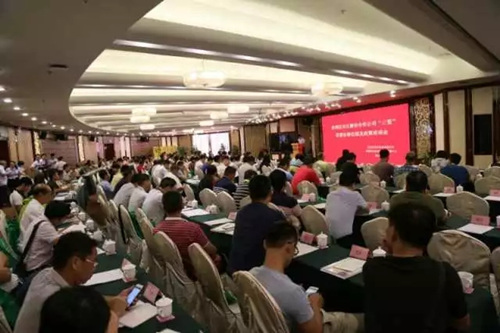Zhuhai's community collective economy gains momentum
Updated: 2017-09-25  Print
Print 

Xiangzhou's community collective economy has experienced strong momentum, increasing year-by-year in terms of both total assets and gross annual income, according to a training session held in the district on Sept 21.
More than 200 people took part in the training on laws, regulations and policies for local community's collective capital, assets and resources, among them staff members of the joint-stock companies and government officials.

Xiangzhou district holds a training session on laws, regulations and policies of community collective capital, assets and resources on Sept 21, Zhuhai.
In 2001, Xiangzhou District took the lead to covert villages under its jurisdiction into communities and established joint-stock companies replacing rural cooperatives, which are expected to play a better role in managing the community's operational collective capital, assets and resources.
For more than a dozen years the development of those joint-stock companies has been a top priority on Xiangzhou District's agenda. The government has been striving to speed up reform and promote the flow of rural assets to increase farmers' income.
In the first eight months of this year, 104 collective property deals were opened for trade, up 4 percent year-on-year, of which 77 completed transactions, recording an increase of 45 percent.
A total of 240,100-square meter collective land has been leased with the first year's contract value reaching 29.87 million yuan ($3.20 million), local media reported.

More than 200 people take part in the training to learn how to better manage the community collective economy. [Photos courtesy WeChat anccount: zhxiangzhou]
Xiangzhou District has improved its supervision and management system of collective assets, upgrading its supervisory platforms to advance a sustained and healthy development of rural collective economy.
Since 2016, Xiangzhou Distirct has released several guidelines and regulations, and established a multi-layer and comprehensive regulatory mechanism to ensure all operations of the joint-stock enterprises is carried out based on law.
Unlike the general balance sheets filled with complicated jargon and terms, the economic management center has created an easy-to-understand financial statement and released it to the public at a regular time, facilitating those investors to follow the company's performance.
In addition, local government will subsidize and give financial rewards to joint-stock enterprises which pass annual assessment, being a boost to promote community economic development and standardized operation of companies.
 Xiangzhou District, Zhuhai
Xiangzhou District, Zhuhai

 Foreign Reports
Foreign Reports Investment Environment of Xiangzhou
Investment Environment of Xiangzhou